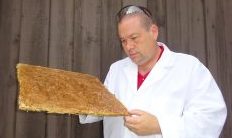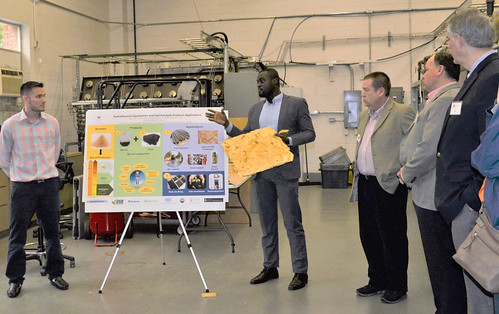Soy flour could soon replace petroleum—at least in adhesives used in the manufacturing of particleboard.
Professor Brian Via of the Auburn University School of Forestry and Wildlife Sciences has obtained a patent that will allow soy flour to replace petroleum-based adhesives traditionally utilized to manufacture wood components in particleboard, an engineered wood product commonly used in indoor furniture.
This innovative method will provide a more cost-effective and ecofriendly alternative to commonly used petroleum-based products, thus lowering the amount of formaldehyde released from formaldehyde-based adhesives.
Via, who is also director of forest products at the school, worked with William G. Hand, research and development manager at Georgia-Pacific and a former graduate student in chemical engineering at Auburn, and Sujit Banerjee, professor emeritus at the Georgia Tech School of Chemical and Biomolecular Engineering, on the research that led to the issue of the patent.
The binder, or glue, used in manufacturing these wood components comprises a large portion of the manufacturing price, so substituting a less expensive component such as soy flour could significantly reduce the product’s cost.
This shift is poised to add value to soybeans while saving money for companies that opt to use the newly introduced method. Improved air quality resulting from a reduction of the release of formaldehyde is a major advantage, as well.
Prior to this research, manufacturers considered soy flour-based adhesives to be ineffective for wood components because the soy thickened too quickly. Via and his fellow researchers found that heating the soy-adhesive mixture prior to application resulted in an adequate replacement for the petroleum-based adhesives.
The United Soybean Board sponsored the research that helped to collect data for the patent, titled “The use of soy flour in resin formulations used to manufacture engineered wood composites” (patent number 10266694). The patent was filed in March 2016 and issued in April 2019.
The new patent could result in a major shift in this sector of wood manufacturing, said School of Forestry and Wildlife Sciences Dean Janaki Alavalapati.
“This patent, a result of the substantial research of Dr. Via and his team, presents a significantly improved method of wood component manufacturing,” Alavalapati said. “It has the potential to cut manufacturing costs, improve air quality and boost the region’s soybean industry. It is a breakthrough that provides major improvements on multiple fronts.”
Originally published August 5th, 2019.
(Written by Teri Greene)











